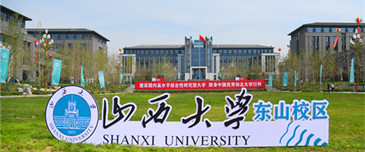School of Economics and Management
Updated: 2021-03-05
The School of Economics and Management offers one of the strongest disciplines at Shanxi University.
The school's history can be traced back to 1933 when the Department of Economics was formally established.
The school has eight undergraduate majors: Economics, Economics Statistics, Finance, International Trade, Information Management and Information Systems, Accounting, Business Administration, and Electronic Commerce. The school has four research master's programs (i.e., Management Science and Engineering, Theoretical Economics, Business Administration, and Library Information and Archives Management) and five taught master's programs (i.e., MBA, MPAcc, Master's of Project Management, Master's of Logistics Engineering, and Master's of Library and Information). It also has two doctorate programs, which are Theoretical Economics and Management Science and Engineering.
The school's arrangement and development of majors meets the needs of the national economy and social development. The "undergraduate-master-doctor" trinity talent training mechanism has been preliminarily established, aiming to achieve the goal of "general training for undergraduates, academic training for research postgraduates, and practical training for taught postgraduates."
Currently, there are more than 2,500 registered students in the school, and the number of people taking the school's postgraduate entrance examination is at the forefront in Shanxi province.
Also, the post-graduation rate of employment for people who attend Shanxi University's School of Economics and Management is the highest in the province, meaning the school cultivates many talented professionals in China.
The faculty comprises 132 research-active experts and 15 administrative staff members, including 22 professors and 57 associated professors.
Among them, two experts received a special government allowance; one was honored for academic excellence by the New Century Talent Supporting Project of the Chinese Ministry of Education; two were winners of the "100-talent program" in Shanxi province; seven were honored as Young Outstanding Faculties of Shanxi Province; one received the Shanxi Young Scientist Award, and two were honored as outstanding teachers in Shanxi province.
Also, the school employs more than 10 experts and scholars from well-known domestic and overseas universities and enterprises as its visiting professors, honorary professors and adjunct professors, promoting the development of the school.
Recently, the School of Economics and Management's faculty members have produced influential research results related to financial engineering and risk management, logistics and supply chains, modern management theory and method, financial management, information management and systems, e-commerce, Jin-merchants studies, economics, industrial economics, human resource management and strategic management, among other areas. The school's faculty members have published more than 800 papers in SSCI, SCI and CSSCI indexed journals and more than 40 monographs and teaching materials. School staffers have also received more than 40 provincial and national awards.
The school has undertaken and finished more than 30 projects supported by the National Nature Science Foundation, National Social Science Foundation and the MOE Project of Humanities and Social Sciences. The school also provides more than 100 projects for enterprises, institutions and governments at all levels, with funds of more than 20 million yuan ($3.09 million).
The School of Economics and Management always pays attention to national and international research collaboration.
The bilateral academic exchange mechanism has been established with universities and research institutes, including Idaho State University in the USA, Nottingham University in the UK, the University College of Cape Breton in Canada, the University of Technology Sydney in Australia, the Research Center of China, Japan and South Korea in the School of Advanced Studies in the Social Sciences in France, Warsaw University in Poland, Yokohama National University in Japan, the India Institute of Management, Beijing University, Tianjin University, Xi'an Jiaotong University, Nanjing University, the Academy of Mathematics and Systems Science in the Chinese Academy of Sciences (CAS), the Institute of Policy and Management in CAS, and the Institute of Industrial Economics of the Chinese Academy of Social Sciences.
INTERNATIONAL EDUCATION EXCHANGE
-
 Confucius Institutes
Confucius Institutes The Confucius Institutes are set up worldwide by the Chinese Language Council International to promote Chinese language and culture.
-
 Enrollment of Foreign Students in Shanxi University
Enrollment of Foreign Students in Shanxi University Join us and explore our wide range of study programs and enjoy a first class educational experience that makes you a part of a lively global community.

